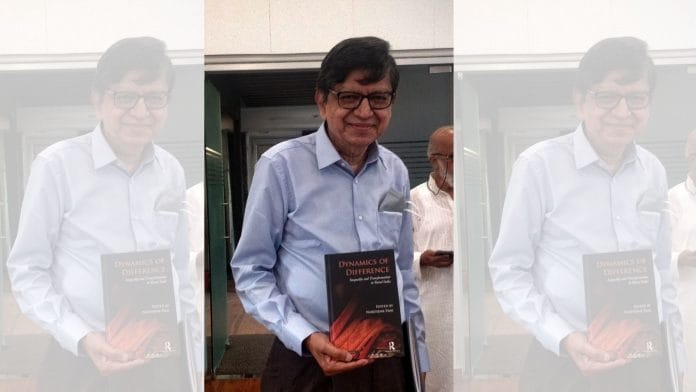New Delhi: India’s failure to understand the theoretical methods to measure inequality was the reason why the Covid-induced migration and poverty came as a shock, said economist Narendra Pani Thursday as he released his new book examining inequality in rural India.
“You did not understand it (inequality), you kept measuring it. And when your theoretical models faded away, you really did not know why you had these levels of inequality and what explained it. And there were situations that emerged from inequality that captured everyone, including the government…this is particularly true of the Covid crisis when there were literally millions of workers on the streets and nobody knew why,” said Pani, who is a professor at the National Institute of Advanced Studies.
The book titled ‘Dynamics of difference: Inequality and transformation in rural India’ was the result of a four-year-long study undertaken by the professor along with his students and young researchers.
Speaking at the book launch, Pani went on to describe the book as primarily dealing with the “causes and consequences” of inequality that he believed were generally overlooked in other works. Describing his approach in the book as “Darwinian”, he said, “We had a series of methods coming up (to create their argument in the book) but only the fittest methods survived.”
The event, held at India International Centre (IIC) in the capital, was attended by IIC president – NN Vohra, along with eminent panelists.
For panelist Shiv Visvanathan, sociologist and professor at OP Jindal Global University, the book spelt out the two different kinds of metaphysics: a standard universal version of inequality and the theory of diversity, hence the play on ‘differences’ in the name.
“The whole question, how do you look at diversity? I think that is the basis of the new sciences. And it’s fascinating how he built the language of suffering into science,” he said.
This was an aspect of the book all the panelists agreed upon. Pani’s book, in his own words, described five interconnected inequalities ranging from regional, intergenerational to intergroup and interpersonal/intrapersonal inequality.
‘Book not above criticism’
While elaborating on his book, the author underlined the text was not above criticism and the event was followed by an engaging discussion among the panelists.
Visvanathan was the first to ask whether the book be treated as a “monument or something more open”. He chided Pani amiably about how he would posit some ideas – how epistemology is a new possibility in the book or challenge the “19th-century dream of inequality” – in the book only to abandon it moments later.
Another panel member Amarjeet Sinha, a former advisor to Prime Minister Narendra Modi, said one can see shades of sociology, economics and political science in the book.
“The theoretical foundations are very strong. But what you’re looking for… What does this lead to? And that’s where you feel perhaps some of those nuances may have been captured a little better,” he remarked.
While Vohra appreciated the author for his “erudite and highly researched essays on an essential theme”, he believed the book had some parts that were “difficult to absorb” and pronounced it was not an “easy read”.
Former Union Secretary of Agriculture Siraj Hussain, who was also a panelist at the launch, raised the issue of the book having data only up to 2014 but commended Pani for writing on inequality – something that is “not the most discussed topic today”. Hussain was especially impressed how despite the data constraints the book had covered policymaking aspects during Covid.
“The book has covered it, you know, how the poor were treated? And what was the attitude of India’s middle classes to the people who had to walk hundreds of kilometers,” he said.
Also read: New book looks at rebellion by ‘enslaved’ villagers who founded UP’s Azad Nagar in 2000






